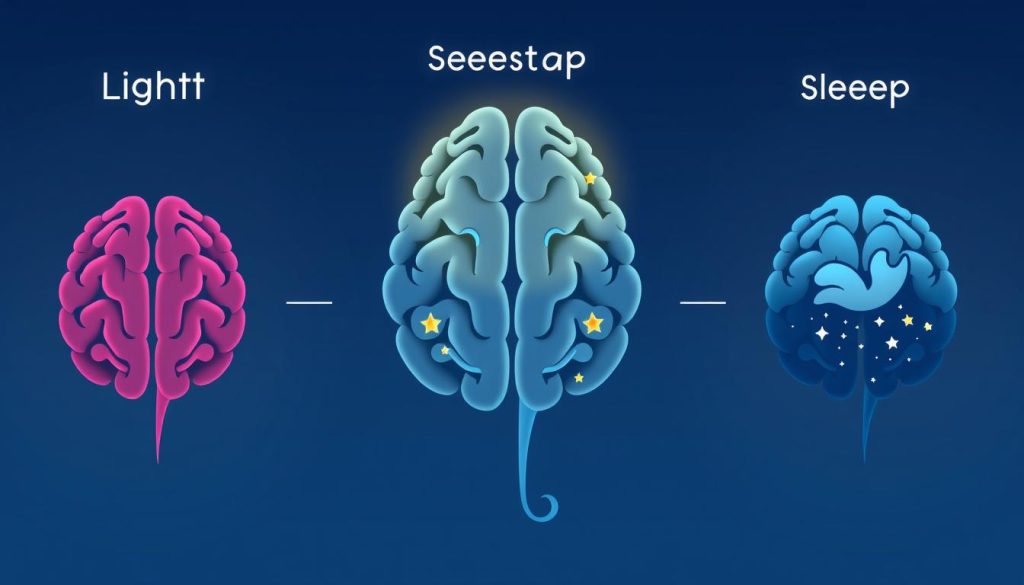Exploring the world of circadian rhythm and sleep-wake cycle reveals how they control my sleep and energy. These processes are crucial, affecting when I feel tired or awake. They also play a big role in my health.
Learning about them helps me do better during the day and sleep better at night. It’s key to improving my daily life and getting quality sleep.
What is Circadian Rhythm?
A circadian rhythm is a natural process that controls our sleep-wake cycle, happening every 24 hours. It’s also known as our biological clock. Knowing about circadian rhythm helps us see its big role in our lives. It affects not just sleep but also hormone release, metabolism, and mood.
A working biological clock keeps us balanced and full of energy all day.
Definition and Importance
The circadian rhythm tells my body how to react to the day’s time. It’s key for managing sleep, alertness, and health. The role of circadian rhythm is huge.
When it’s off, I might struggle with sleep, mood swings, and metabolic problems. A steady circadian rhythm leads to better sleep, which is vital for my health.
The Science Behind Circadian Rhythms
The science of circadian rhythms reveals a complex system led by the hypothalamus. This brain part acts as a control center, responding to light and darkness. Light in the morning helps me wake up, while darkness at night lets melatonin prepare me for sleep.

The Basics of the Sleep-Wake Cycle
The sleep-wake cycle is key to my daily life. It includes different sleep phases that affect my health. Knowing about REM and NREM sleep helps me see why each stage is important for a balanced life.
Phases of Sleep
Every night, I go through several sleep cycles, each lasting about 90 minutes. These cycles include:
- NREM sleep: This phase is vital for my body’s repair. It has three stages where my body fixes itself.
- REM sleep: This phase is linked to dreaming. It boosts brain activity and is crucial for my mental and emotional health.
How Sleep-Wake Cycle Works
The sleep-wake cycle is complex, influenced by my internal rhythms and outside factors. My internal clock, set by light and daily habits, helps control this cycle. When I don’t get enough sleep, my body feels tired. This is because it’s trying to find balance.
Understanding how this works helps me sleep better and stay energized during the day.

How Circadian Rhythm and Sleep-Wake Cycle Affect My Health
It’s key to understand how my circadian rhythm and sleep-wake cycle affect my health. Disruptions in these natural patterns can cause mental and physical problems. My sleep habits are linked to many health issues.
The Link Between Circadian Rhythm and Mental Health
The connection between my circadian rhythm and mental health is strong. Irregular sleep can affect my mood and emotional stability. Studies show that poor sleep can lead to depression and low mood.
A study in JAMA Psychiatry found that bad sleep makes me feel hopeless and tired. But, a regular sleep schedule can improve my mood. This makes it easier to face daily challenges.
Physical Health Impacts
My physical health is also tied to my circadian rhythm. Irregular sleep can increase the risk of diseases like obesity and diabetes. Quality sleep helps regulate hormones, affecting stress and hunger.
A review in Sleep Medicine Reviews talks about how bad sleep can harm my health. It shows the importance of healthy sleep habits and routines.

| Health Aspect | Effects of Disruption | Benefits of Balance |
|---|---|---|
| Mental Health | Increased anxiety and depression | Improved mood stability |
| Physical Health | Higher risk of chronic diseases | Stronger immune function |
| Hormone Regulation | Imbalanced stress hormones | Better appetite control |
Signs of an Imbalanced Circadian Rhythm
If my circadian rhythm is out of sync, I may notice several signs. These include feeling tired during the day, trouble sleeping at night, or waking up often. I might also feel irritable and have trouble concentrating.
Research in the journal Sleep shows these issues can hurt my mood and thinking skills.
Common Symptoms to Watch For
Looking for signs of disrupted sleep can help. Feeling slow, struggling to stay awake in the afternoon, or having trouble focusing are common signs. These symptoms often point to a problem with my circadian rhythm.
Keeping a regular sleep schedule is key. If these signs keep showing up, it’s time to check my lifestyle and habits.
Causes of Disruption
Knowing what disrupts my circadian rhythm is crucial. Irregular sleep, too much screen time, and stress can affect my internal clock. Environmental factors like noise and light pollution can also mess with my sleep.
The American Academy of Sleep Medicine says knowing these causes helps me fix my sleep cycle. This improves my energy and overall health.

